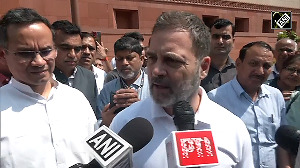
Naveen Kukreja explains the finer points to keep in mind while planning for your retirement.
Most people spend their initial working years fulfilling goals like buying a house and giving the best education to their children.
Paying equated monthly instalments (EMIs) and tuition fees usually come at the cost of sacrificing retirement savings.
It leaves little scope to build an adequate retirement corpus in the latter half of the working lives.
As you approach your fifties, your financial responsibilities also grow as your children reach marriageable age.
To ensure that you live comfortably in the golden years, you need to follow three mantras to create an adequate corpus -- start early, choose the right investments, and be persistent.
The first step, however, is to estimate how much money you need to accumulate for your retired life.
An individual needs to ascertain the lifestyle s/he will lead decades later and how price rise will affect expenses then.
1. Don't underestimate expenses
Most people assume a steep reduction in their daily expenses after retirement.
Expenses like daily commuting, EMIs and children's education expenses will reduce post-retirement. But some expenditure, like medical, which were lower during your working life, are likely to shoot up significantly post-retirement.
Your expenses will also depend on the lifestyle you choose to lead after retirement.
If you want to see the world and travel regularly, for example, you need to factor it in when calculating the retirement corpus you will need.
Ignoring factors like lifestyle could end up with you having an inadequate retirement corpus.
2. Account for inflation
Those investing for retirement often fail to understand how inflation can affect their retirement plans.
By reducing the purchasing power of your retirement kitty, inflation can severely hamper your standard of living post-retirement.
Assuming an annual average inflation rate of 8 per cent, goods or services worth Rs 100 at present will cost Rs 466 after 20 years. After 30 years, that same goods or services will cost over Rs 1,000.
When estimating monthly expenses post-retirement, increase them by at least 10 to 12 per cent a year to be on the safer side.
To avoid inflation from eating into your retirement corpus, invest most of your retirement contributions in a time-tested inflation-beating asset class like equities.
3. Pay heed to longevity risk
Future advances in medical sciences are likely to ensure an increase in our average life expectancy rates.
The longer you live, the higher is the risk of emptying your retirement corpus.
The best way to deal with this risk is to maintain a sizeable exposure to equities even during your post-retirement life.
Also, assume your post-retirement life will last for at least 30 years.
4. Taxes can hamper your calculations
Most people don't factor in post-retirement tax liability while estimating their retirement corpus.
While retirement may mean the end of your monthly pay cheque, it does not mean the end of your income.
You will still earn interest from your fixed deposits, savings accounts and annuities or book some capital gains from your mutual funds and other investments.
At present, all of them attract taxes depending on the income or capital gains derived from them.
Even the maturity proceeds of most retirement products, including National Pension Scheme, are not entirely tax-free.
While it is challenging to forecast the tax regime 20 or 30 years down the line due to frequent changes in tax laws, the current tax regime can be used to arrive at tax-adjusted cash flows during post-retirement.
Use the current tax rates applicable to highest tax slabs while estimating the size of your post-retirement corpus and the monthly income target.
A conservative approach in budgeting your post-retirement tax liability will leave you better prepared to deal with tax uncertainties in later years.
5. Avoid overestimating portfolio returns
As you enter your retired life, your corpus will replace your monthly pay cheques as the primary means of meeting your basic needs.
This will necessitate the introduction of a certain degree of capital protection and assured income in your retirement corpus.
As you near your retirement, a majority of your corpus will require a steady shift from high-risk asset classes like equities to low-risk ones like debt funds.
Such a shift will also reduce the overall returns from your post-retirement corpus.
Failure to factor in such dips in your portfolio returns can adversely impact your post-retired life.
6. Don't ignore medical inflation
Healthcare services in India have witnessed a high rate of inflation in recent years, and this is expected to grow faster in future.
According to some industry estimates, healthcare services have clocked an average inflation rate of around 15 per cent over the past few years.
Advances in medical sciences along with longer life expectancy will further increase your medical costs in the golden years.
Any under-estimation of medical inflation while calculating your retirement corpus might mean that you end up with an inadequate retirement kitty.
This, in turn, might force you to redeem your post-retirement corpus at a faster rate or avail expensive loans to meet your medical expenses.
Additionally, buy health insurance policies to cover yourself against medical costs.
Get these policies as early as possible as you may have to serve waiting periods before qualifying for certain treatments, pre-existing illness coverage, surgeries, etc.
Buying them early will also earn you no-claim or loyalty bonus in the form of increased sum assured.
Naveen Kukreja is CEO and co-founder, Paisabazaar.com
Illustration: Uttam Ghosh/Rediff.com











 © 2025
© 2025